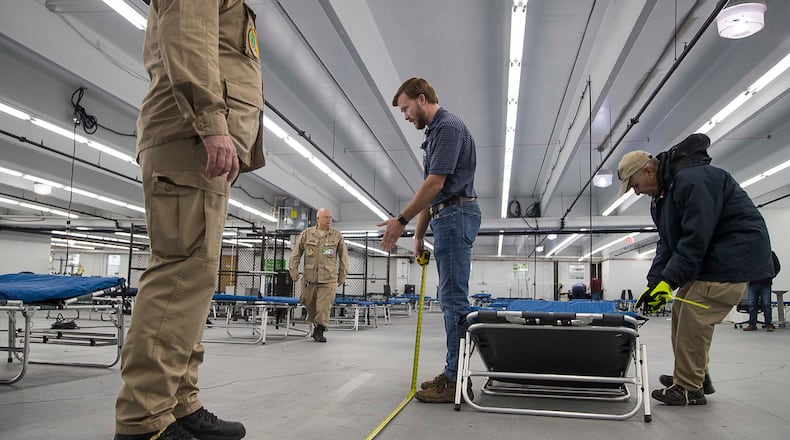Georgia's bill for fighting the coronavirus pandemic is escalating at a time when state revenue is plummeting.
Though the full cost of the pandemic to date is not known, a single state department — the Georgia Emergency Management and Homeland Security Agency — has authorized $85.3 million in spending to combat the coronavirus through mid-April, documents obtained by The Atlanta Journal-Constitution show.
Those expenditures range from a whopping $32.9 million for masks and face shields to a sobering $36,263 for body bags. They also include millions of dollars for purchasing ventilators, building temporary hospitals and providing other pandemic necessities.
The records indicate the expenditures have been authorized, but that doesn’t necessarily mean all the money has been spent. State budget officials say they don’t know the grand total that Georgia has spent to date, across all agencies, to fight the pandemic.
But the price tag is likely to grow in the weeks and months ahead. For example, the cost of opening a temporary hospital at the Georgia World Congress Center — a cost not included in the $85.3 million GEMA total — is estimated at $21.5 million, records show.
House Appropriations Chairman Terry England, R-Auburn, said he expects the state to have ongoing pandemic health care costs.
“It’s not going to go away until a vaccine is out there or somebody comes up with some kind of medicine to shorten the time you are sick or lessens the illness,” England said. “Short of seeing some sort of breakthrough like that, I think we are still going to have some lingering effects into the 2021 budget.”
Those expenses come as Georgia officials are bracing for a dramatic drop in state revenue, thanks to what could be a serious and prolonged economic recession.
Georgia isn't the only state in a financial bind. The economic impact of the pandemic on state and local governments across the country could exceed that of the Great Recession a decade ago.
Meanwhile, the costs of Medicaid, unemployment insurance and other programs are rising amid the economic slowdown. And that doesn’t include the direct cost of fighting the pandemic.
The GEMA records reviewed by the AJC offer a glimpse of that spending. The newspaper reviewed purchase orders, contracts and other documents for the agency’s pandemic spending through April 15.
The expenditures include numerous purchases of masks and face shields totaling $32.9 million. Other big-ticket purchases include $18.2 million for ventilators, $4.4 million for surgical gowns and $10.9 million to design and build temporary hospitals in Albany, Gainesville, Macon and Rome.
Some expenditures are relatively small, but they underscore the seriousness of the pandemic — including $61,200 for refrigerated trailers for mobile morgues. Others reveal the sheer scale of the state’s response, such as the purchase of $829,978 worth of hand sanitizer, which doesn’t include other purchases for sanitizer included with orders for other goods.
In the short run, paying for such expenditures shouldn't be a problem. In March, the General Assembly approved $100 million in coronavirus funding. Of that, about $86.5 million has been authorized to be spent out of the governor's emergency fund. The federal government also is chipping in big money to help pay for coronovirus expenses.
But the long run may prove more challenging — especially with the state likely facing a budget crisis.
Congress is expected to consider more aid to state and local governments in a new pandemic relief bill this summer. But it’s unclear whether it will be enough to cover pandemic expenses, let alone plug other holes in state and local government budgets. U.S. Senate Majority Leader Mitch McConnell has expressed skepticism about whether the federal government should bail out the states, though he has recently sounded more open to the idea.
The Georgia Budget and Policy Institute estimated the state will see at least a $4 billion drop in revenue in the next 15 months.
The drop could be far steeper because of the economic shutdown over the past month, which led to hundreds of thousands of Georgian being added to the unemployment rolls.
State agencies were told Friday that they should plan on cutting more than $3.5 billion from their budgets in the upcoming fiscal year, a move that could bring furloughs and layoffs among Georgia’s 200,000 teachers and state employees.
At the same time, the state expects ongoing costs to fight the pandemic in the coming year, leading to increased spending on health care. Many families of the unemployed are now eligible for Medicaid, the public health care program for the poor, disabled and nursing home residents, and those costs could skyrocket as well.
So the $85.3 million figure is only likely a starting point for the costs associated with the epidemic.
England said some of the things the state is doing with mobile units and opening hospital wings will likely continue as the state tries to both improve public health programs and prepare for the next health crisis.
“In doing so, you may not have another coronavirus outbreak, but you might have a bad flu outbreak,” he said, “and we need to be prepared.”
Keep Reading
The Latest
Featured




